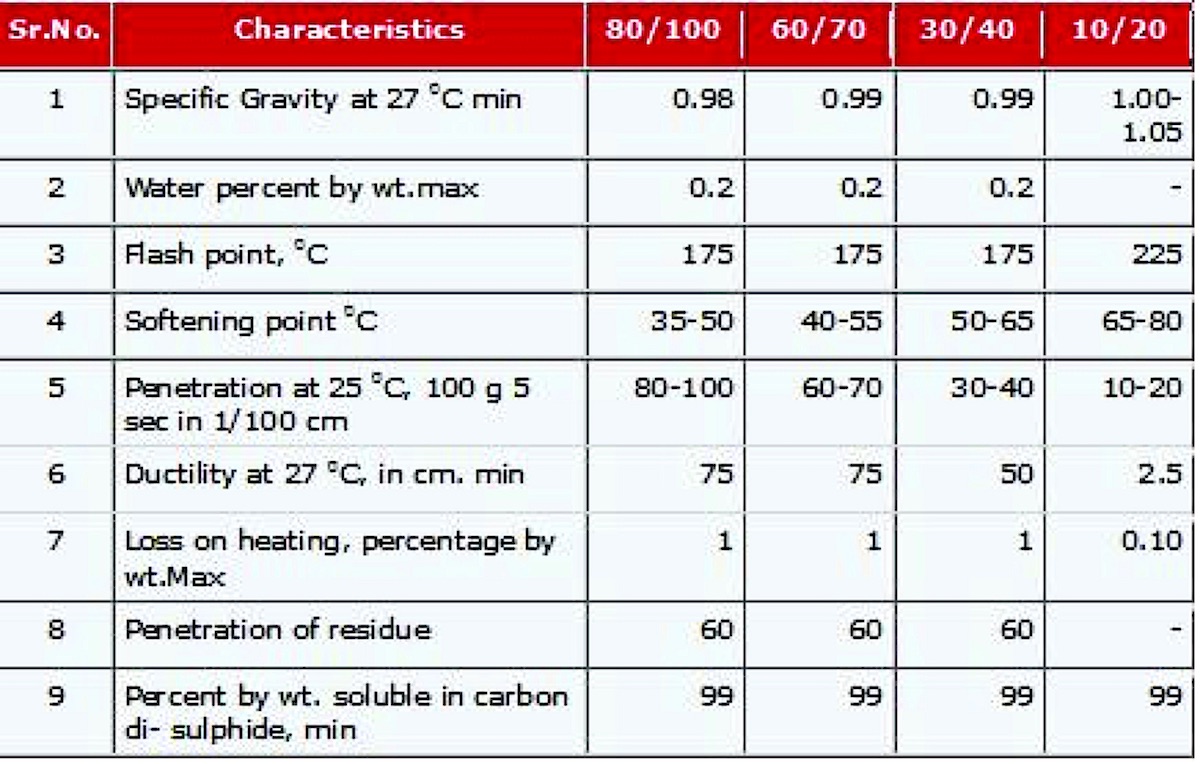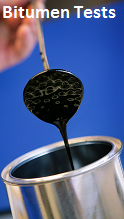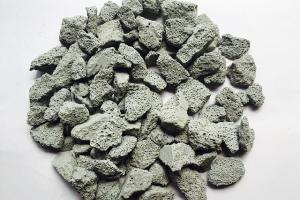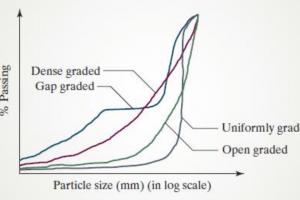Properties of Bitumen and Bituminous Materials

Following are the properties of Bitumen
- Adhesion
- Resistance to Water
- Hardness
- Viscosity and Flow
- Softening Point
- Ductility
- Specific Gravity
- Durability
- Versatility
- Economical
- Strength
![]() See also: Applications of Bitumen
See also: Applications of Bitumen
Adhesion:
The adhesive property of bitumen binds together all the components without bringing about any positive or negative changes in their properties. Bitumen has the ability to adhere to a solid surface in a fluid state depending on the nature of the surface. The presence of water on the surface will prevent adhesion.
Resistance to Water:
Bitumen is insoluble in water and can serve as an effective sealant Bitumen is water resistant. Under some conditions water may be absorbed by minute quantities of inorganic salts in the bitumen or filler in it.
Hardness:
To measure the hardness of bitumen, the penetration test is conducted, which measures the depth of penetration in tenths of mm. of a weighted needle in bitumen after a given time, at a known temperature. Commonly a weight of 100 gm is applied for 5 sec at a temperature of 77 °F. The penetration is a measure of hardness. Typical results are 10 for hard coating asphalt, 15 to 40 for roofing asphalt and up to 100 or more for water proofing bitumen.
The grades with penetrations greater than 40 are mostly used in road construction and occasionally in industrial applications. The grades with penetrations less than 40 are used exclusively in industrial applications. In hot climate lower grades such as 60/70 is used.

Viscosity and Flow:
The viscous or flow properties of bitumen are of importance both at high temperature during processing and application and at low temperature to which bitumen is subjected during service. The flow properties of bitumens vary considerably with temperature and stress conditions. Deterioration, or loss of the desirable properties of bitumen, takes the form of hardening. Resultantly, decrease in adhesive and flow properties and an increase in the softening point temperature and coefficient of thermal expansion.
Softening point:
This property make us to know whether given bitumen can be used at the particular place i.e. softening point value should be higher than pavement temperature otherwise bitumen present in the layer get soften and come out.
Softening point is the temperature at which a steel ball falls a known distance through the bitumen when the test assembly is heated at a known rate. Usually the test consist of a (3/8) in dia. steel ball, weight 3.5 gm, which is allowed to sink through a (5/8) in dia, (1/4) in thick disk of bitumen in a brass ring. The whole assembly is heated at a rate of 9 °F per min. Typical values would be 240 °F for coating grade asphalts, 140 °F to 220 °F for roofing asphalt and down to 115 °F for bituminous water proofing material.
Ductility:
Ductility test is conducted to determine the amount bitumen will stretch at temperature below its softening point. A briquette having a cross sectional area of 1 in2 is placed in a tester at 77 °F. Ductility values ranges from 0 to over 150 depending on the type of bitumen.
Presence of ductility means the formation of the film and coating would be proper.
Specific Gravity
Specific gravity of a binder does not influence its behaviour . But all the same, its value is needed in mix design. The property is determined at 27º C.
Durability:
Bitumen durability refers to the long-term resistance to oxidative hardening of the Material in the field. Although, in-service, all bitumens harden with time through reaction.
With oxygen in the air, excessive rates of hardening (poor durability) can lead to premature binder embrittlement and surfacing failure resulting in cracking and chip loss. Bitumen lives upto twenty years if maintained properly throughout the pavement life.
Versatility:
Due to versatility property of Bitumen it is relatively easy to use it in many applications because of its thermoplastic property. It can be spread easily along the underlying pavement layers as it liquefies when heated making the job easier and hardens in a solid mass when cooled.
Economical:
It is available in cheaper rates almost all over the world which makes it feasible and affordable in many applications.
Strength:
Though the coarse aggregates are the main load bearing component in a pavement, bitumen or asphalt also play a vital role in distributing the traffic loads to the layers beneath.
Various Lab Tests on Bitumen
General Properties of Bitumen
- Most bitumens are colloidal in nature.
- Bitumen are thermoplastics.
- They have no specific melting, boiling or freezing point.
- Bitumens are insoluble in water.
- They are highly impermeable to the passage of water.
- They are generally hydrophobic.They are chemically inert.
- Bitumen oxidises slowly.













